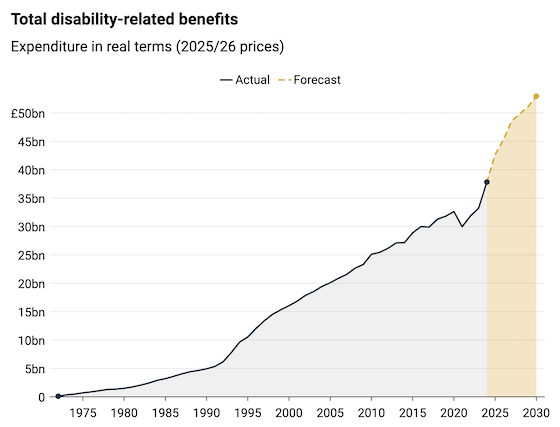It is a global phenomenon: more and more people are dependent, in one way or another, on government. In many cases, that dependency arises from disability, or alleged disability. Despite spending astronomical sums on health care, we have, it seems, more disabled people than at any time in history.
This London Times story is about the U.K., but it could apply to most Western countries: “UK spends more on disability than defence — how did we get here?”
This chart shows the progression in disability-related benefits from the early 70s–zero–to the present, and projected to 2030. This is in inflation-adjusted pounds:
Today, Britain spends more on all sickness benefits than on defence or schools.
***
Although much of the increase in incapacity benefits happened as a result of de-industrialisation in the 1980s…
That makes no sense. Surely, people are more likely to be disabled from heavy farm, construction or industrial labor than from office work.
…the rise in disability spending is more recent. Even as a share of GDP, we are spending ten times as much on the benefits as we did at the start of the 1990s.
So what is going on?
Britain is becoming sicker. This is partly simply because we are getting older as a population and partly also because we eat badly and do not exercise enough.
No doubt that is true, although compared with the past I suspect the Brits are eating pretty well. But other trends are positive: certainly medical technology has improved.
The Starmer government, facing a reality that is plainly unsustainable, is proposing reforms:
More than two thirds of those with joint and muscle conditions look likely to see payments stopped. The unspoken argument is plain: Britain can no longer afford to subsidise people for the illnesses that come with ageing.
But it isn’t only, or even primarily, the elderly: the Times notes that 24% of working-age people now claim a disability. The vast majority are employed, but receiving disability benefits.
In Britain as in America, mental health is a major part of the picture:
NHS figures on Thursday found that 23 per cent of people of working age now have a mental disorder, up from 18 per cent a decade ago, rising to 26 per cent in 16 to 24 year-olds.
Young people are most likely to claim benefits for mental health problems and there is growing concern about a generation who may do so for decades.
Most likely they will, if they can.
I don’t think there is any mystery about what is happening. If government offers money, people will line up to get the money. If getting money takes a note from your doctor, doctors will write notes for their patients. If a boy is just rowdy, no money changes hands. If he has ADHD, his family gets money. If a young person is depressed, as young people often are, no money changes hands. But if a young person suffers from depression, she can claim disability. Perhaps forever. Half the people in the world have bad backs, to one degree or another. If a note from your doctor about your back gets you money, there will be lots of doctors’ notes.
This situation can’t go on. It isn’t viable to have a society where we all write one another checks, based on purported disability or disadvantage. Ultimately, someone has to pay the bills. And that “someone” is becoming fewer and fewer people all the time.
















